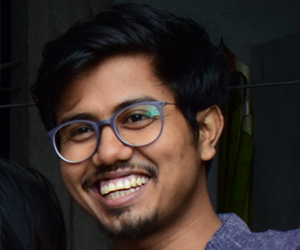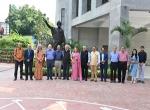On February 21, the Vivekananda International Foundation (VIF) organised an interaction with the visiting Armenian delegation about the developments in the Eurasia region. Lt. General R. K. Sawhney delivered the opening remarks, highlighting the close cultural connections between India and Armenia, followed by a brief introduction to the current situation in the South Caucasus and how the shifting alliances are going to affect the region by Ambassador D. P. Srivastava.
The meeting was attended by Lt. General R. K. Sawhney, Lt Gen. (Dr) Rakesh Sharma, Ambassador D. P. Srivastava, Brig Vinod Anand, Mr. Raghvendra Singh, Dr. Pravesh Kumar Gupta, Mr. Anurag Sharma and Mr. Saudiptendu Ray from the VIF. The Armenian delegation was represented by Mr. Benyamin Poghosyan, Ms. Lusine Toroyan, Ms. Nvard Chalikyan, Mr. Karen Mkrtchyan, Mr. Davit Antonyan and Mr. Rananjay Anand from two organisations, namely the Applied Policy Research Institute Armenia (APRI Armenia) and the Indo-Armenian Friendship NGO.
Mr. Benyamin Poghosyan from the Applied Policy Research Institute of Armenia talked about the multiple challenges faced by Armenia. The primary threat to Armenia comes from Azerbaijan, which has the full support of Turkey. After the recent wars with Azerbaijan and the subsequent loss of Nagorno-Karabakh, Armenia has lost its strategic depth in the south of Armenia, as the distance between Azerbaijan and Turkey at its narrowest is just 25 km. Even after the military takeover of Nagorno-Karabakh, Azerbaijan has no intention of establishing peace with Armenia. Azerbaijan has increased its imports of weapons from Turkey and Israel and is planning a fresh military escalation, possibly by the end of 2024. The idea is to connect Azerbaijan with Turkey through a land bridge. Despite all this, Armenia is willing to be part of the negotiations with Azerbaijan.
The Armenian government has simultaneously launched the process of military reform and is also purchasing new armaments to strengthen its military. In recent years, Armenia has become one of the largest buyers of Indian weapons. Armenia also requires geopolitical partners who may have some influence on Azerbaijan in Turkish decision-making. The Islamic Republic of Iran is absolutely against Azerbaijan and Turkey having a common border, which will cut Iran's access to Armenia, which is the only land connection Iran has with Europe. Russia is a key player in the region, and it also has a significant military presence in the south of Armenia. India, as a rising power, will be one of the significant pillars of the multi-polar world. India is also interested in an alternative route to reach Europe via Iran, Armenia, Georgia and the Black Sea, which will circumvent the Suez Canal. Therefore, if Azerbaijan attacks Armenia and cuts off Armenia from Iran, it will also cut off this potential route for India to reach Europe. India can influence South Caucasus geopolitics by supporting Armenia. Armenia can also be a centre for the production of spare parts for Indian weapons, which have been extensively sold in the region. Armenia and India can also cooperate in developing military software for UAVs and conduct military drills in the region to strengthen military ties. India-Armenian future cooperation can be a tool to counter the threats faced by Armenia.
Lt Gen. (Dr) Rakesh Sharma talked about the economic dependence of the West and Europe on Azerbaijani oil and natural gas. This limits their ability to intervene in the conflict in favour of Armenia. He also stated that the Armenian military upgradation should focus on smaller and cheaper military platforms rather than expensive and big military platforms. Armenia shares a good relationship with Iran, and it should procure the Shahed 136 drone, which is a formidable platform. Armenia has to fight it out with Azerbaijan and deny them the Zangezur corridor, which can link Azerbaijan with Turkey.
Both sides reiterated that Armenian foreign policy should be to diversify relations with new partners without decoupling from Russia. Armenia should try to build relations with the West without antagonising the Russians and Iranians. Armenia should be very cautious not to become an area of contention between Russia and the West, like Ukraine. There was also talk about further developing cultural connections between India and Armenia with the help of interaction and experience sharing initiatives between Indian museums and Armenian museums.









Post new comment